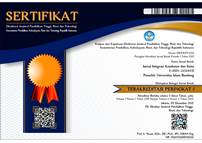Hubungan Lama Pengobatan dan Jenis Obat Antiepilepsi dengan Derajat Depresi pada Pasien Epilepsi
Abstract
Epilepsi merupakan kelainan otak kronik yang ditandai dengan kecenderungan terjadi bangkitan epileptik. Terapi epilepsi dilakukan dalam jangka waktu yang lama untuk mengurangi kejadian bangkitan sehingga dapat meningkatkan kemungkinan terjadi efek samping di antaranya depresi. Depresi pada pengobatan epilepsi berhubungan dengan jenis obat antiepilepsi dan lama pengobatan. Penelitian ini bertujuan mengetahui hubungan lama pengobatan dan jenis obat epilepsi dengan derajat depresi pada pasien epilepsi. Metode penelitian ini merupakan observasi analitik dengan rancangan potong lintang. Subjek penelitian adalah 74 pasien epilepsi di Poli Saraf RSUD Al-Ihsan periode Maret–Mei 2018 yang memenuhi kriteria inklusi, yaitu pasien yang sudah meminum obat antiepilepsi generasi pertama monoterapi minimal satu bulan. Sampel dipilih secara purposive sampling dan telah mengisi kuesioner Beck Depression Inventory II. Data penelitian dianalisis dengan uji statistik menggunakan Uji Fischer Exact. Hasil penelitian ini menunjukkan jumlah pasien epilepsi yang mengalami depresi derajat minimal paling banyak ditemukan dan tidak terdapat hubungan lama pengobatan dan jenis obat antiepilepsi dengan derajat depresi pada pasien epilepsi. Kejadian depresi pada pasien epilepsi selain dipengaruhi jenis obat dan lama pengobatan juga dipengaruhi oleh keadaan epilepsi (frekuensi kejang dan jenis epilepsi), faktor iatrogenik (obat antiepilepsi), dan faktor psikososial.
ASSOCIATION OF DURATION MEDICATION AND TYPES OF ANTI EPILEPTIC DRUGS WITH DEGREE OF DEPRESSION IN PATIENT WITH EPILEPSY
Epilepsy is a chronic disorder of brain which characterized episode of epileptic seizures. Duration treatment of epilepsy is in quite long period to reduce the incidence of seizure, this condition can increase the risk of side effects such as depression. Depression in patients with epilepsy is associated with the type of anti-epilepsy drugs and the duration of treatment. This study was to determine the relationship between the duration of treatment and the type of epilepsy drug with the degree of depression in patients with epilepsy. This research was an analytic observation with cross sectional design. Subjects were 74 epileptic patients in the Nerve Outpatient of Al-Ihsan General Hospital in the period March—May 2018 which met the inclusion criteria who had taken anti epileptic drugs first generation monotherapy for at least 1 month. The sample was chosen by purposive sampling and has filled out the Beck Depression Inventory II questionnaire. Research data were analyzed by statistical test using Fischer Exact test. The results in this study patients with epilepsy who has minimal degree of depression is most common and there was no relationship between treatment duration and type of anti-epileptic drugs with degrees of depression in epilepsy patients. The incidence of depression in patients with epilepsy not only caused by the type of drug and duration of treatment but can also caused by epilepsy condition itself (seizure frequency and type of epilepsy), iatrogenic factors (anti-epileptic drugs) and psychosocial factors.
Keywords
Full Text:
PDFReferences
WHO | Epilepsy [Internet]. Jenewa: World Health Organization; 2017.
Fisher RS, Acevedo C, Arzimanoglou A, Bogacz A, Helen Cross J, Elger CE, dkk. A practical clinical definition of epilepsy. Epilepsia. 2014;55(4):475–82.
Josephson CB, Jetté N. Psychiatric comorbidities in epilepsy. Int Rev Psychiatry. 2017;29(5):409–24.
Ekinci O, Titus JB, Rodopman AA, Berkem M, Trevathan E. Depression and anxiety in children and adolescents with epilepsy: Prevalence, risk factors, and treatment. Epilepsy Behav. 2009;14(1):8–18.
Tao K, Wang X. The comorbidity of epilepsy and depression: diagnosis and treatment. Expert Rev Neurother. 2016;16(11):1321–33.
Mula M, Sander JW. Negative effects of antiepileptic drugs on mood in patients with epilepsy. Drug Saf. 2007;30(7):555–67.
Schousboe A, Madsen KK, Barker-Haliski ML, White HS. The GABA synapse as a target for antiepileptic drugs: a historical overview focused on GABA Transporters. Neurochem Res. 2014;39(10):1980–7.
Mughni MH, Mahama CN. Profil penyandang epilepsi di Poliklinik Saraf RSUP Prof. Dr. R. D. Kandou Manado. J e-Clinic. 2015;4:1–5.
Indonesia MKR. Formularium Nasional 2013. 2013;53(9):12.
Wiglusz MS, Landowski J, Michalak L, Cubała WJ. Reevaluating the prevalence and diagnostic subtypes of depressive disorders in epilepsy. Epilepsy Behav. 2015;53:15–9.
Shehata GA, Bateh AEM, Hamed SA, Rageh TA, Elsorogy YB. Neuropsychological effects of antiepileptic drugs (carbamazepine versus valproate) in adult males with epilepsy. Neuropsychiatr Dis Treat. 2009;5:527–33.
Mula M, Monaco F. Antiepileptic drugs and psychopathology of epilepsy: an update. Epileptic Disord. 2009;11(1):1–9.
Ropper AH, Samuels MA, Klein J, Prasad S. Adams & Victor’s principles of neurology. Edisi ke-11. Canadian. McGraw Hill Education; 2015.
Basak AK, Chatterjee T. Structural and neurochemical alterations in brain regions of depression and suicide patients. Clin Depress. 2016;2(3):1–6.
Wen X, Meador KJ, Loring DW, Eisenschenk S, Segal R, Hartzema AG. Is antiepileptic drug use related to depression and suicidal ideation among patients with epilepsy? Epilepsy Behav. 2010;19(3):494–500.
Bosak M, Turaj W, Dudek D, Siwek M, Szczudlik A. Depressogenic medications and other risk factors for depression among Polish patients with epilepsy. Neuropsychiatr Dis Treat. 2015 Sep 30;11:2509–17. doi: 10.2147/NDT.S91538. eCollection 2015
Sadock BJ, Sadock VA, Ruiz P. Synopsis of psychiatry: behavioral science/ clinical psychiatry. Synopsis of psychiatry: behavioral science/clinical psychiatry. Edisi ke-11. New York: Wolters Kluwer. 2015.
Eddy CM, Rickards HE, Cavanna AE. Behavioral adverse effects of antiepileptic drugs in epilepsy. J Clin Psychopharmacol. 2012;32(3):362–75.
Harsono. Behavior changes in epilepsy patients. Edisi ke-2. Yogyakarta: Gadjah Mada University Press; 2014.
Zhang ZJ, Tan QR, Tong Y, Li Q, Kang WH, Zhen XC, dkk. The effectiveness of carbamazepine in unipolar depression: a double-blind, randomized, placebo-controlled study. J Affect Disord. 2008;109(1–2):91–7.
Karouni M, Arulthas S, Larsson PG, Rytter E, Johannessen SI, Landmark CJ. Psychiatric comorbidity in patients with epilepsy: a population-based study. Eur J Clin Pharmacol. 2010;66(11):1151–60.
DOI: https://doi.org/10.29313/jiks.v1i2.4344
Refbacks
- There are currently no refbacks.
Jurnal Integrasi Kesehatan dan Sains is licensed under a Creative Commons Attribution-NonCommercial-ShareAlike 4.0 International License.







.png)
_(1).png)




















